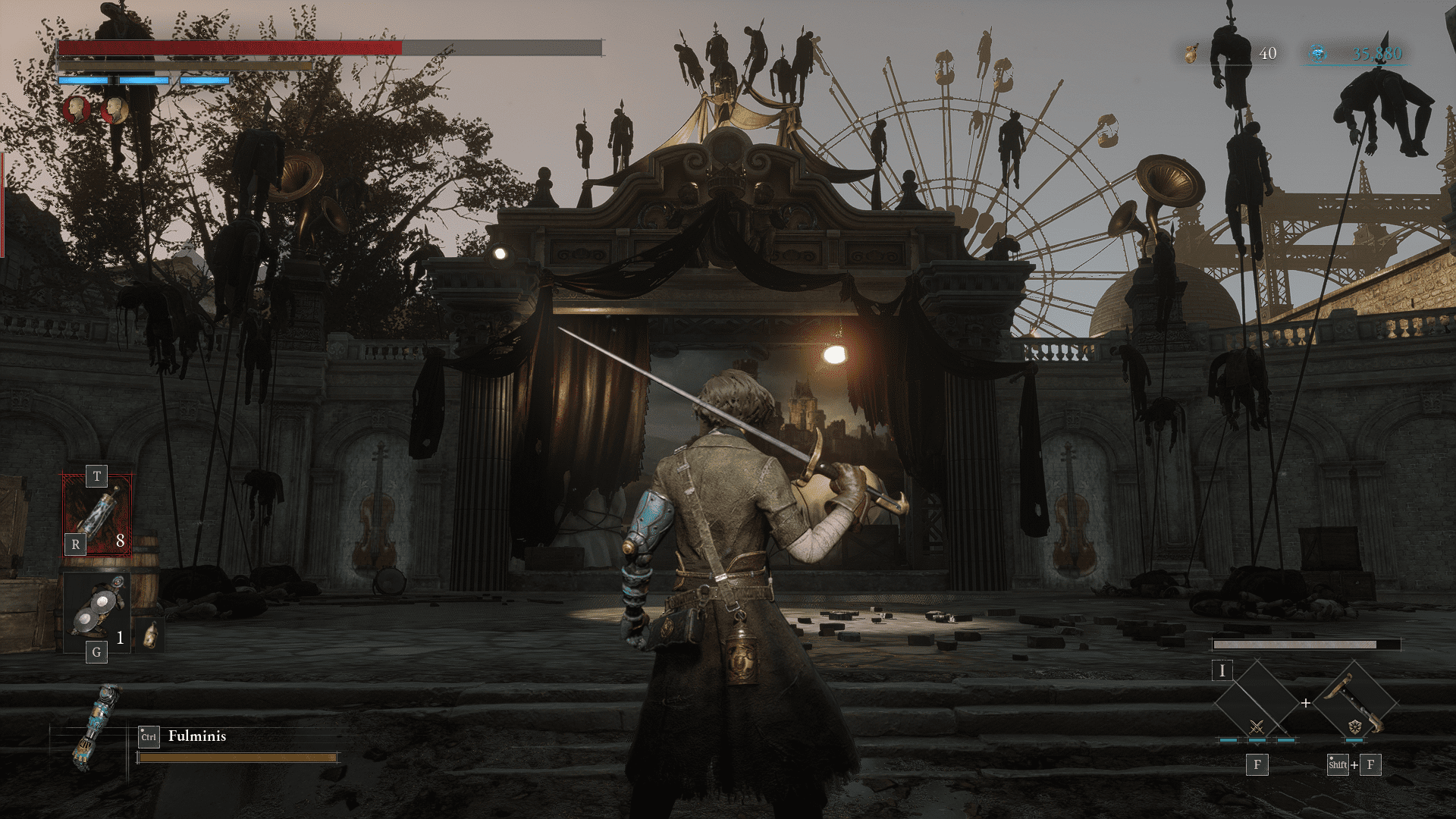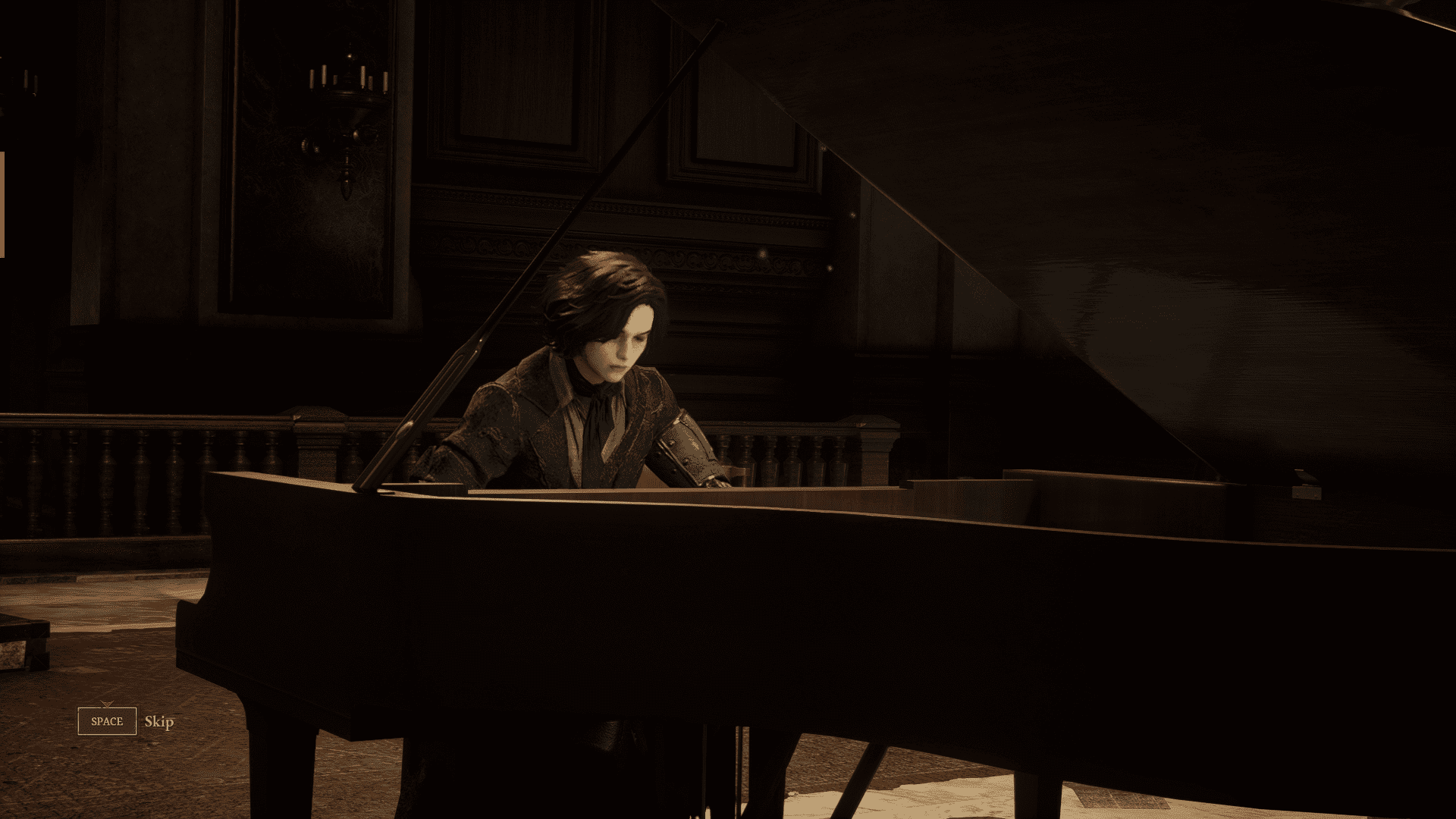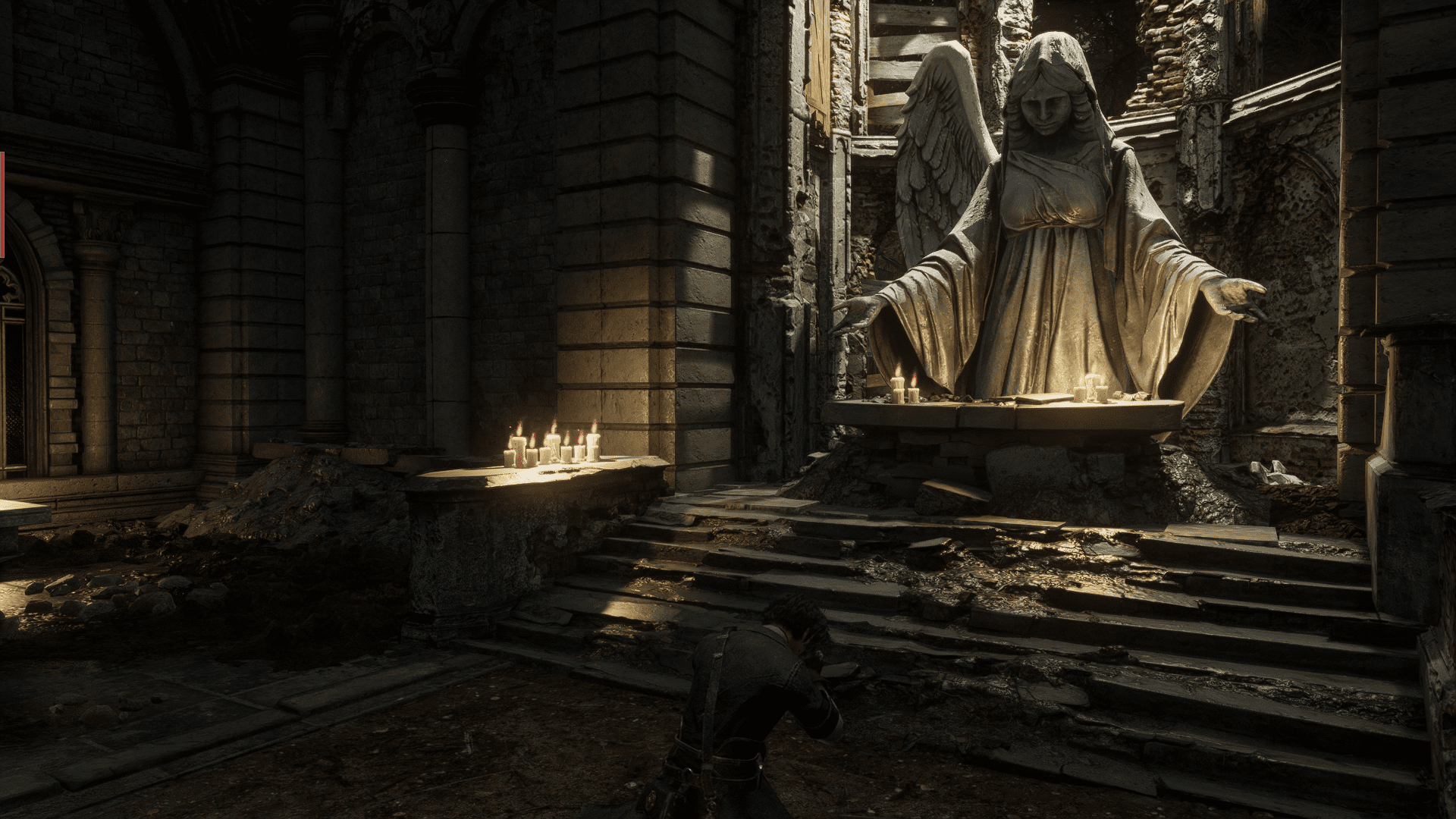Getting out of one’s comfort zone when it comes to video games is much harder than I think most people give it credit for. Time and money for leisure is limited, so why risk it on something that you’d normally find unappealing? It was this mindset by which I had initially passed over today’s title. Despite the general accolades associated with it, I couldn’t help being soured on the idea of playing a Souls-like due to the sense of elitism surrounding the genre, and dark-fantasy reimagining of older stories tend to be one of the schlockiest and most contemptible forms of media out there. After watching a video essay regarding the game’s themes and means of adaptation though, I finally decided to give the title a chance. Having now completed the main story, I’m ready to give a take of my own. Enough ‘stringing’ you along! you’re here for a review, so let us ‘cut’ to the chase!

Developed and published by NEOWIZ and released in September of 2023, Lies of P is Action-RPG pain-train available on PC, Xbox One, Xbox Series X, PS4, and PS5. Its premise involves a special puppet boy combating a city overrun by berserk puppets and illness, whilst trying to uncover the many conspiracies behind the chaos. Players interact with the game through level-based action combat, a variety of upgrade systems, light orienteering and platforming, talking to npcs, and listening to music (yes this is a very serious game mechanic I’ll explain soon). Please note I played the PC version of the game.
The story of Lies of P takes place in the city of Krat and follows the tale of Gepetto’s Puppet, and since he is never given a proper name save perhaps for one spoilery exception, I’m going to refer to him from now on as ‘P’. P awakens to the pleas of a blue butterfly and is thrust into ruined city streets, where he must cut his way through countless puppets and monsters which are the remnants of a disaster known as the Puppet Frenzy. He seems to be in a good position to take them on too, as he’s one of the few puppets not bound by the laws of robotics that govern the rest, particularly in his ability to tell lies. The game’s story will see him unite with the survivors of the disaster, fight off many horrors, and ultimately discover the truth behind the fate of Krat.
This game intentionally shrouds itself in a lot of mystery at the start so it’s difficult to summarize too much here without spoilers, but overall I’ll go ahead and say that I actually wound up enjoying the narrative on offer. Lies of P’s various chapters weave a world that’s not terribly explicit yet intriguing to learn more about, and features a supporting cast of characters who are quite easy to like. The environmental storytelling in particular is quite good, as it’s easy to imagine what life used to be like in the city and what disaster befell each particular district on your own. It’s not likely to top most people’s video game story charts but as a vehicle for the rest of the game it’s quite effective, and what themes it does bring to the table are thought provoking. As far as the game being an adaptation of Carlo Colodi’s The Adventures of Pinocchio goes, I think it depends on the mindset you go into Lies of P with. If your main concern is simply the very notion of this game being a dark revision of the original story or you hate the idea of these characters aping names from the famous book, then yeah you won’t like it and I’m not here to take that from you. After hearing arguments about how the story preserves the spirit of the original book insofar as it shares the core theme of “being a true human means being wary of manipulation” however, I was able to appreciate what the story was trying to do.

As for the gameplay side of things, Lies of P is a Souls-like through and through. You progress through various zones with an emphasis on checkpoints and shortcuts, and fight through enemies in a tough combat system that punishes and rewards in equal measure. Actions are very committal, be it attacking, dodging, or blocking. Most encounters range from small fry that you can overwhelm after finding one opening, to very challenging bosses which will push your wits to their limit. The trademark difficulty of the genre was on in full force, and yet I felt things were surprisingly fair and I had lots of opportunity to succeed on my own terms. Enemies had clear wind-up animations, and even if I sometimes had to tank damage in order to learn a new attack timing it was rarely so much damage that the fight was unsalvageable. Admittedly there did come a point in the game where I started running past the bigger enemies due to how challenging it all is, but this didn’t actually have too much effect on my ability to clear the game. The main mechanic that truly displays mastery over the game is learning to parry the enemy’s attacks in order to build their stagger faster, and that doesn’t require proficiency at taking down every last enemy type. Most of the bosses even allow you to summon a computer-controlled ally into the arena, and while not totally trivializing you can absolutely get good at abusing the bosses’ targeting patterns to rack up tons of damage.
Exploration in the game is fairly simple. Level design in Lies of P when compared to what I’ve heard of classic Souls design is surprisingly straightforward, with side paths that don’t overstay their welcome and shortcuts being placed mostly to ferry you to and from checkpoints when you need them most. This winds up emphasizing the game’s combat-centric design more, especially after you die and are forced to fight your way back to your lost Ergo. Exploration is still worth your time however, as you can collect great rewards like additional upgrade materials and bonus cosmetic items, in addition to discovering side quests necessary to seeing everything the game has to offer.
Preparing for combat thus takes on a whole other level of importance in Lies of P, and here is where I think the game’s systems shine the brightest. Leveling up is as simple as exchanging Ergo for each stat point you wish to increase, but the rest is quite a bit more involved. The key example here is the weapon system, which breaks itself into both handles and blades which are upgraded separately and can be combined in any combination you wish. To demonstrate this system’s genius I’ll explain how my personal weapon came about. I started the game with the powerhouse Motivity build in order to take the enemies down in a few decisive strikes, but as the boss fights ramped up in difficulty I was starting to think that the greatsword’s slow swings were just a bit too slow for comfort. I tried sticking a rapier blade on the handle, and sure enough it swung faster but there was a damage penalty when using a slashing attack instead of a stabbing one. It was almost checkmate, until I realized that after the greatsword hilt’s opening light stab I could pivot into its heavy stab, and basically just loop those two buttons so that the weapon rarely performed slashing attacks. Consequently I slapped a Motivity crank to the handle, dumped my moonstones into the blade and voila: a totally unique weapon which I forged to complement my playstyle, which only exists because I took the time to learn what was possible in the game’s systems. Throw in the various options for Legion Arms, grindstones, and the P-Organ upgrade tree, and you have an character-building system that is incredibly wide in the number of strategies it permits. When I play the game again, I am more than excited to see what else is possible here.

The last gameplay mechanic I want to discuss is the hidden process which is commonly referred to as gaining Humanity. One of P’s main goals is obviously to become a real human, so throughout the game you’ll encounter various ways to gain Humanity. This will have various effects in game with the most important being that the message for gaining Humanity changes to represent your viability to get the real ending. “You feel warmth” basically qualifies you to fight the true final boss, and “Your heart is pounding” qualifies you for the canon ending of the game provided you reach it before the major Sophia decision near the end of the game (and pick the “correct” option regarding Sophia). The main means of gaining Humanity is through selecting certain dialogue options, mostly lies, but you can also gain it by fully listening to various music records, and even what is essentially an Easter egg where you get some bonus Humanity by praying at a certain altar. Love to see it! We’ll get deeper into the implications of this system later, but I did want to share that you can actually avoid the bad ending without being a serial liar. You do probably have to tell some lies so I went ahead and limited myself to the most arguably defensive ones, but some of the major “lies” actually feel more like genuine opinions such as with the very impactful dialog with Lady Antonia. Even having only obtained about half the records you can get in one playthrough, it really added up. And at the end of the day, the game giving grace to those who find more humanity in honesty is all I was hoping for.
Presentation wise, Lies of P is artistically very strong. It combines elements of post-industrial Italy with belle époque French aesthetics to create a truly memorable style. Most of it is ravaged by disaster and as such isn’t exactly bursting with life or color, but the sense that it once did shines through and conveys a profound sense of loss. The enemy design also deserves special praise, being as clear and readable for gameplay as they are gosh darn horrific nightmare fuel. Overall just a visually spot on experience. The music likewise is also excellent, as while used sparingly to maintain atmosphere it is full of heart-pounding orchestrals and bittersweet accordion pieces to really set the tone. There’s even a variety of vocal performances from different artists around the world, which are both captivating and reinforce Krat as once a marvel famed across all lands. Making the player stop to appreciate the soundtrack’s highlights to gain Humanity was thoroughly risky, but the beautiful music more than earns its place of honor within the game’s progression loop.

Finally for today’s spiritual takeaway, I’d like to critically examine the game’s idea of lying being a mark of one’s humanity. I could give a simple meditation on how P for all intents and purposes can’t really be human so long as he remains in a puppet body, doing the usual philosophical spiel about the definition of humanity and so on. But the notion that P would be declared human by the end of the game without satisfying both the ‘rational’ and ‘animal’ aspects of being human is just a given that I chose to look past, for the sake of actually getting to Lies of P’s more central themes. Spoilers ahead!
From a purely in universe perspective, lying serves as the primary vessel for P’s humanity because of the Grand Covenant’s fourth law that most puppets are beholden to, thus his lies become a means to actively distinguish himself from his pseudo-Asimov-bound kin. Moving into the more thematic side of this narrative device however, things begin to get more mixed. On one hand there’s a major villain whose plan is more or less to make humanity into a hivemind where no lies are possible, and asserting that this is an inhuman thing is correct. The ability to make choices is in my opinion a key part of what makes humanity what it is, and I think God clearly supports this view in the evidence of how He made us. In the same way a sane man would choose the difficult but genuine accomplishment of coming to build the understanding and love necessary to marry a good maiden over settling for forever simping over a character in a dating sim whom he can easily look up all the details of and manipulate, so to I think God bears a true desire for a real and loving connection from those who freely chose Him instead of the shallow puppeteering stereotype of Him that often plagues eastern games. It is in this respect that I can accept the symbolism of lies as proof of one’s humanity, but this thematic gets a little more questionable once you dwell further on the lies that led up to this climax.
Aside from merely defying the Grand Covenant, P’s lies (the outright ones anyways) are typically ones with an angle that are reflective of human instincts. The ones made to protect oneself are mostly understandable, but very often P is explicitly rewarded for telling lies that are ‘kind’ and spare the feelings of others. While such lies are undoubtedly part of the human instincts, they are often destructive in ways the game fails to appreciate. Carlo Colodi actually provides the perfect framework for this observation in chapter 17 of his book: “Lies, my boy, are known in a moment. There are two kinds of lies, lies with short legs and lies with long noses.” If the lies with long noses are understood to be obvious lies which The Adventures of Pinocchio mostly dealt in, then Lies of P is a game that mostly examines and glorifies lies with short legs. Those lies which can help people carry on in the moment but can’t take them far before the truth catches up to them, and usually cause the truth to hurt more than it otherwise might. It is this hidden cruelty that bothers me so much about Lies of P’s Humanity system, especially when later in the game this moral maxim of mitigating hurt is used to push the player into effectively euthanizing two of the game’s central characters (albeit the circumstances around the second instance of this are more complicated, but I’m spoiling enough here as is).
And beyond the harm which lying eventually causes, is it truly fair to say that there isn’t a certain kindness and indeed humanity in helping others face the truth? To be fair the game does have a few choices that give Humanity through truthfulness, such as by indirectly rewarding an honest response with a music record, but other scenarios in the game have ways in which the truth can be kindness. For example in Julian’s side quest you can either say you saw evidence of his puppet lover’s affection or agree you’ve never heard of such a thing, and while the love is technically true P can’t know that at the time of the quest and thus reporting on it is treated as the lie option. By the game’s logic, easing Julian’s heart with a lie is seen as the more humane option, but by admitting you have no evidence of their love he actually comes to gratefully accept that it’s time for him to awaken from his dream and face an uncertain future. Is there not a beauty and a kinship in helping others come to such realizations, a kindness equal to if not greater than the lie? I certainly think so, and even if the love between Julian and the puppet was ultimately real within the story’s fiction I don’t think anyone can blame P or the player for choosing to report on the facts they do have rather than feeding what appears to be a delusion. Though we as humans have this ability to lie we need not define ourselves by it, and in fact I believe it is far more human to be able to gain mastery over our liar instinct rather than to be compelled (manipulated, even) by it. Perhaps the writers of Lies of P and I simply have very different ideas about what the ‘strings’ that prevent us from being fully human truly are, though as I mentioned the game doesn’t force you into endless lies just to avoid the bad ending so perhaps even they were at least somewhat conscious of this alternate perspective themselves. I am ultimately grateful God has given us the chance to live as real moral agents and seek understanding of this world’s strings with our own eyes, using the developers’ art as a chance to explore and learn together. Growth through education was one of Colodi’s most dearly championed causes after all.

In summary, Lies of P is a fantastic game filled with satisfying and memorable combat and a unique setting which balances inspiration and innovation to spectacular results. There might be some odd implications in the game’s lie system when viewed from a meta-moral perspective, but if you can meet the game on its own terms and don’t mind some spookiness, then you’ll find it to be an unusually captivating experience that’s worth all the trouble its difficulty will put you through. This title has been a great change of pace for me, and I can’t wait to see how the Overture DLC turns out. “Don’t knock it till you try it” might not be the most helpful piece of advice, but occasionally old phrases, much like old children’s tales, really do show us why they’ve endured.
Scoring: 95%
Gameplay: 5/5
Story: 4/5
Art and Graphics: 5/5
Music: 5/5
Replayability: 5/5
Morality/Parental Warnings
Lies of P is a dark fantasy video with a decent variety of content to be wary of. The main crux of the game is found in combat, in which you will mostly beat down puppet robots and horrible mutated carcasses in melee combat with swords. Blood is a toggleable option, although you will occasionally still quite vividly stab through your opponents. Most of the enemies in the game are quite frightening in their appearances, from zombie-like abominations to puppets made to imitate anything from soldiers to clowns to nursery infants. Human opponents are also occasionally fought and killed. The overarching mystical power known as Ergo is essentially stated to be the manifested leftovers of human lives, and the game ultimately uses this as a basis for a dualistic view of the soul and human nature. Treasure boxes and certain pieces of technology have the freemason symbol on them, though why this is the case I’m not sure. In order to get the best ending the player is encouraged to tell a lot of lies, as well as a few other debatable actions such as executing someone in an act of revenge or euthanizing certain characters.
One of the primary villain factions is a group of alchemists who clearly draw upon general aesthetics of esoterism, with their base in particular being full of strange and eerie shrines. Human experimentation is a major theme surrounding this faction too. The ruined church featured in the game borrows quite heavily from Catholicism in its design and the characters do talk about “God” with a capital G, however there isn’t enough evidence to prove that the faith practiced in Krat is anything other than a fantasy religion (likely centered around the descent of the angel whose body would become the foundation of Ergo). Outfit design is pretty much modest across the board, and language is similarly clean.
